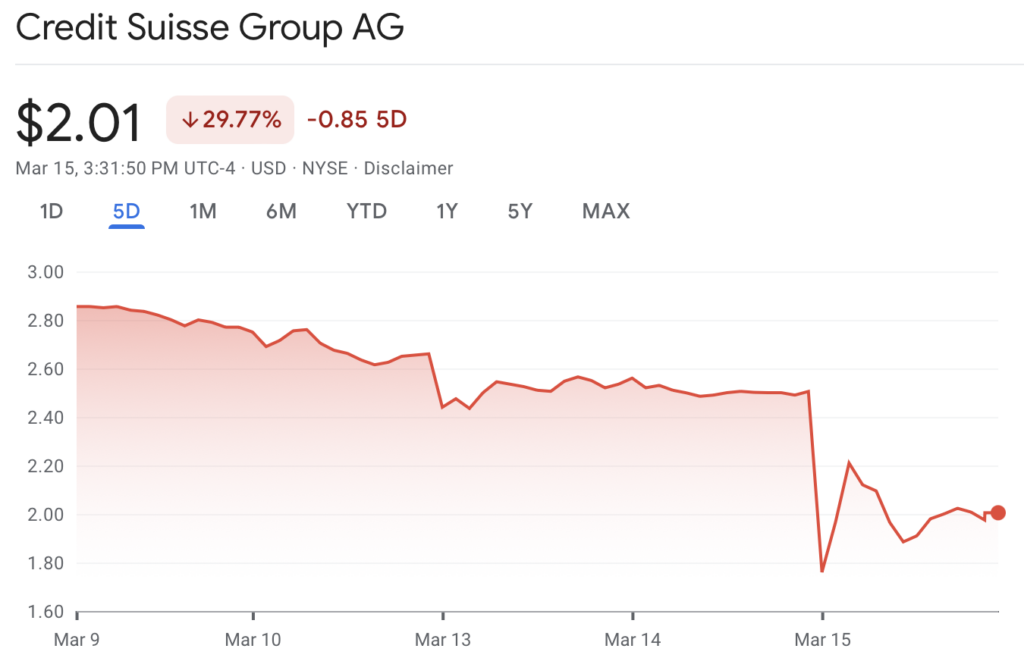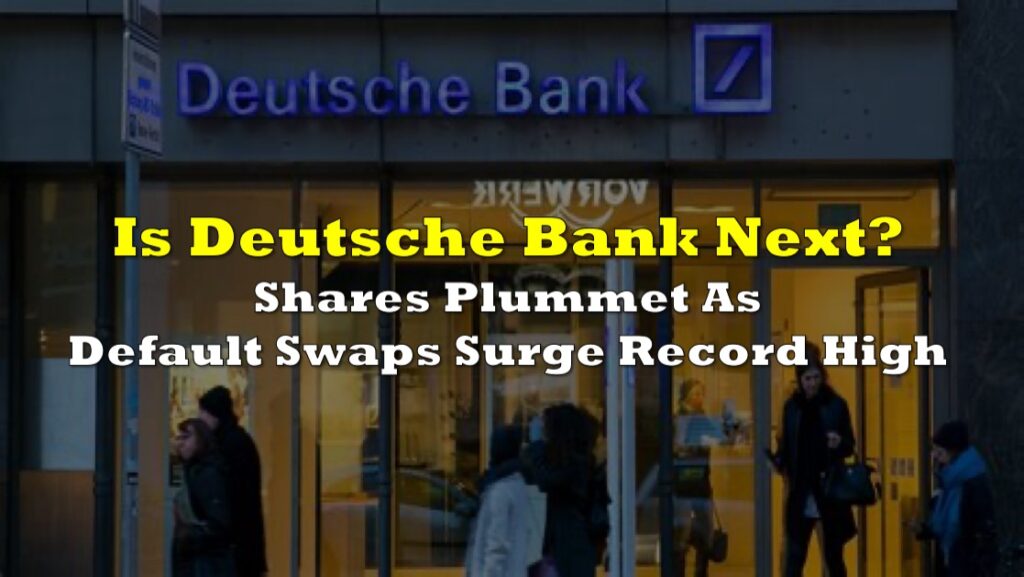While asserting calm that Credit Suisse (NYSE: CS) “meets the capital and liquidity requirements imposed on systemically important banks” amid the series of bank collapses in recent days, the Swiss National Bank (SNB) said it is ready to provide the bank with liquidity “if necessary.”
🚨 SNB and FINMA issue statement on market uncertainty
— PiQ (@PriapusIQ) March 15, 2023
"Credit Suisse meets the capital and liquidity requirements imposed on systemically important banks.
If necessary, the SNB will provide $CS with liquidity." pic.twitter.com/iMLB9FxwyA
The statement comes after Credit Suisse became the latest bank feared to be the next to face liquidity concerns following Silvergate Bank, Silicon Valley Bank, Signature Bank, and First Republic Bank.
In a joint statement, the SNB and the Swiss Financial Market Supervisory Authority (FINMA) emphasized that there are no indications of a direct risk of contagion for Swiss institutions as a result of the current turbulence in the US banking system.
All Swiss banks are required to maintain capital and liquidity buffers that meet or exceed the minimum requirements of the Basel regulations. Furthermore, banks that are systemically significant must fulfill higher capital and liquidity criteria. This enables the negative consequences of big crises and shocks to be absorbed.
In recent days, market reactions have had a significant impact on Credit Suisse’s stock value and the value of its debt securities. FINMA maintains constant communication with the bank and has access to all supervisory law-related information.
“Against this background, FINMA confirms that Credit Suisse meets the higher capital and liquidity requirements applicable to systemically important banks. In addition, the SNB will provide liquidity to the globally active bank if necessary,” the regulators said.
Credit Suisse’s top shareholder, whose stake has lost more than one-third of its value in three months, has ruled out further investment in the troubled Swiss bank, citing additional regulatory hurdles.
“The answer is absolutely not, for many reasons outside the simplest reason, which is regulatory and statutory,” Saudi National Bank Chairman Ammar Al Khudairy said in an interview with Bloomberg TV on Wednesday, responding on whether the bank was open to further injections if there was another call for additional liquidity.
Credit Suisse fell as much as 30% to a new record low, while the cost of insuring bonds against default in the short term approached a level that typically indicates serious investor concerns.

The recent collapse of SVB, Signature Bank, and Silvergate bank was a warm-up of larger things to come outside of US borders. Crédit Suisse 5-yr insurance against default has gone parabolic this morning. Given their capital structure, they now have three weeks or less to be sold… https://t.co/1CprVjI33u pic.twitter.com/VSGtMpJHt3
— 🇺🇸Kyle Bass🇺🇦 (@Jkylebass) March 15, 2023
*CREDIT SUISSE DOLLAR BONDS DUE 2026 PLUNGE TO DISTRESSED LEVELS
— zerohedge (@zerohedge) March 15, 2023
The bank is only a few months into a complex turnaround plan that will see the Swiss firm spin off its investment banking division while focusing on its core wealth management business. This effort risks being complicated further by financial market unease following the failure of several US regional banks.
On Tuesday, Chief Executive Officer Ulrich Koerner stated that the bank’s financial position is sound, citing a so-called liquidity coverage ratio of about 150%, which it can draw on to meet its obligations. He stated that despite the market turmoil, the firm saw inflows on Monday and is ahead of schedule on its turnaround plan.
“Nobody is pleased by the share price development, but we manage what we can manage, and this is the execution of our plan,” Koerner said in a Bloomberg Television interview.
CREDIT SUISSE CEO: WE ARE A STRONG BANK AND OVERSHOOT ALL REGULATORY REQUIREMENTS
— zerohedge (@zerohedge) March 15, 2023
CREDIT SUISSE CEO: OUR LIQUIDITY BASE IS STRONG
Hate to see what a weak liquidity base would look like
Saudi National Bank, which is 37% controlled by the kingdom’s sovereign wealth fund, acquired a 9.9% interest in Credit Suisse late last year for 1.4 billion Swiss francs. In just a few months, the shareholding has lost more than 500 million francs.
Al Khudairy has stated repeatedly that his bank does not want to increase its stake beyond the current level. He said in October that he “likes” Credit Suisse’s new leadership and their determination to carry out the turnaround plan, but that further equity is “out of the question” for the time being, and that increasing the holding would entail extra regulatory challenges.
“If we go above 10%, all new rules kick in whether it be by our regulator or the Swiss regulator or the European regulator,” he said. “We’re not inclined to get into a new regulatory regime. I can cite five or six other reasons, but one reason is there is a glass ceiling and we’re not going to entertain going beyond it.”
Al Khudairy also stated that his bank is not interested in investing in CS First Boston, the investment bank that Credit Suisse is establishing.
While Koerner identified crucial data to indicate the bank’s financial resilience, there are still questions about the bank’s future. The CDS level is around 9 times that of Deutsche Bank and 18 times that of UBS Group AG, and the CDS curve is substantially inverted, indicating that it costs more to protect against an early failure at the bank rather than a later collapse.
Earlier Wednesday, Chairman Axel Lehmann dismissed any notion that the bank would require government support, saying it “isn’t a topic” for the bank as it works to restore trust among clients, investors, and regulators following a string of errors.
Information for this briefing was found via Bloomberg and the sources mentioned. The author has no securities or affiliations related to this organization. Not a recommendation to buy or sell. Always do additional research and consult a professional before purchasing a security. The author holds no licenses.









